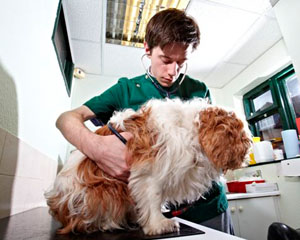10 July 2018
Pet owners should book an appointment with their vet at least three weeks before travel abroad
With the holiday season fast approaching, the British Veterinary Association (BVA) is reminding pet owners to start getting their pets travel-ready if they are planning to take them abroad this summer.
While the
EU Pet Travel Scheme allows for the free movement of dogs, cats and ferrets within Europe with a valid Pet Passport, BVA is advising owners to give serious thought to their pet's health despite the ease of travel. Many diseases that occur abroad are not seen in the UK, which leaves dogs and other pets
potentially unprotected and susceptible to contracting them. Some of these diseases can even be fatal.
BVA recommends that pet owners visit their local vet at least three weeks before travelling to make sure that their pet and its passport are ready for holidays, as some of the preventive medications must be started before leaving the UK. Tick treatments are
no longer required under the scheme, but with many of the diseases transmitted by biting insects and ticks, BVA strongly advises that preventive, or prophylactic, tick treatment is continued.
British Veterinary Association Senior Vice President Gudrun Ravetz said:
“Pets are a big part of the family and so it's great that they are able to join their owners on holiday, but it's important to remember that the free movement of our pets overseas shouldn't translate into the free movement of disease. I would encourage owners
to contact their local vet for more information on pet travel requirements and to book an appointment as soon as possible to make sure their pet is fully protected when it travels.”
BVA has created a handy Pet Travel Checklist to remind owners of what checks their pet needs before the holiday:
- Book an appointment with your vet at least three weeks before travel to get your pet started on the right medication at the right time. Discuss the countries you intend to travel so that your vet can identify specific health risks your pet may be exposed to
- Check that the rabies vaccination and pet passport are up to date
- Ensure the microchip is working and reading correctly
- Speak to your vet about preventive treatment needed to protect your dog against ticks, sandflies, heartworm and tapeworm and any other potential parasites or diseases
- Talk to your vet if going somewhere hot to discuss prevention of heatstroke and how to recognise signs of the problem in your dog
- Identify a local vet in the area where you will be holidaying in case of an emergency and to administer (necessary) tapeworm treatment to dogs one to five days before arrival back into the UK.
If your pet becomes ill after returning to the UK it is very important to tell your vet that you have been abroad with your pet, even if it was some time ago.
For more information on diseases that pets may encounter abroad, owners are encouraged to read the
Animal Welfare Foundation's guide,
'Taking your pets abroad' and see the
latest government advice on pet travel.



